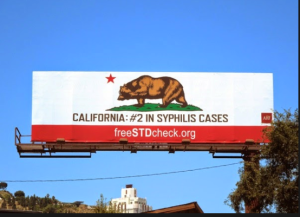Demystifying information on pregnancy, fertility,
and all the things about our ladyparrts
About me
Contact me
Gold medal syphilis status
California may be #2 for syphilis cases, but don’t let that silver medal status discourage you. There is plenty of syphilis to go around, especially in LA. Los Angeles County came in first place for the total number of syphilis cases reported from 2003-2012 for individual cities and counties.
Every day on my drive to work I see that billboard. Every day in my office a patient wants screening for sexually transmitted infections and asks about syphilis because they’ve seen the billboards too.
So what exactly is syphilis?
Syphilis is a sexually transmitted infection caused by the bacteria Treponema pallidum. Transmission usually occurs through contact with an infectious lesion during sex. It can occur by kissing or touching a person who has active lesions on the lips, oral cavity, breasts, or genitals.
Time from exposure to time of symptoms: 21 days, on average.
The first symptom is usually a painless 1-2 cm papule (that’s medical jargon for bump) that ulcerates soon after formation. Many people don’t notice it because it’s painless. It heals after a few weeks, even without treatment. This is called primary syphilis. (I won’t even tell you what part of the body this picture is taken from):![]()
Weeks to months later, about 25% of people will develop secondary symptoms (called secondary syphilis): a rash or flu-like symptoms (fever, headache, sore throat, all over body aches and pains).
Now these symptoms are bothersome, but you still may be wondering why this public health frenzy is pushing syphilis.
Here it is:
Untreated, syphilis can cause some very severe complications, anywhere from 1 to 30 years from the time of initial infection. These symptoms include dementia and cognitive deficits, or inflammation of the heart and arteries, or nodular lesions in your skin and bones. Not good.
In pregnancy, syphilis is especially dangerous because it can cross the placenta and affect the fetus. It may cause miscarriage, stillbirth, abnormal growth, and birth defects for the baby, such as deafness and neurologic impairment. These problems can happen early in pregnancy, so it’s best to be diagnosed and treated before you even get pregnant.
The good news: it’s treatable! Antibiotics can get rid of this nasty bacteria for good.
Should you be screened? Only if you are high risk, meaning:
• All pregnant women
• Commercial sex workers
• Person in correctional facilities
• Persons diagnosed with another STI (that’s an abnormal pap, which was probably caused by HPV)
• Men who have sex who engage in high risk behaviors
How are you tested? It’s a simple blood test. It takes a few days for the results to return.
So next time you see that billboard, don’t automatically assume you have syphilis. But if you’re high risk in any way, be honest with your doctor and she will get you the screening you need.
Sources:
• US Preventive Services Task Force, Screening for Syphilis
• ACOG
ADD A COMMENT
Dec 1, 2014
Original post published:
* Content reviewed annually for accuracy
Leave a Reply
Submit Form
Want to chat more? Email me directly or fill out the form below!
I cannot respond to patient inquiries (insurance, scheduling, requests for appointments) or requests for medical advice.
You can contact my office at (310) 423-1224 for more information.
If you are an existing patient, message me through your patient portal.

[…] STIs we screen / test for are Chlamydia, Gonorrhea, Trichomonas, Hepatitis B and Hepatitis C, HIV, Syphilis, Herpes, and […]
I’m delighted to share how I successfully overcame the Herpes virus using natural medication {HERBS}. Through a native local medicine prepared by Doctor Awase, I managed to suppress the virus and improve my overall well-being at the first week. Two weeks into taking the medication, I became fine totally and no more single outbreak/symptoms. Today, I’m living a fulfilling and Herpes-free life.![cured] Confirmed by my Doctor after going for a medical checkup. I am herpes free. Demonstrating that natural approaches can offer effective solutions for health challenges such as herpes. He also cures HPV, PCOS, Fibroid, Endometriosis and lots more. See how to reach out below.
WhatsApp +2349074997110
Email:- dr.awaseherbalhome@gmail. com
Do you find your problem hard for you? Infertile or Heartbroken? Are you finding it difficult looking for a reliable herbal healer to cure your sickness? I say this because I have been helped by Lord Krish Spiritual in restoring happiness into my life. My Mom had been sick with Stage 4 Melanoma Cancer which nearly took her life. I was sad because of this sickness and I didn’t know what to do to save my mother’s life. I would never have met Lord Krish if my friend had not introduced him to me by telling me about a herbalist who has helped so many people worldwide and it’s true. I contacted Lord Krish at lordkrishshrine@gmail.com and within 3 days, I received herbal medicine from him through a courier and I used it on my mom. Within a week, mom was cured and healed. I would advise anyone out there to Contact Lord Krish at lordkrishshrine@ gmail. com and meet him to help you with any sickness you are passing through